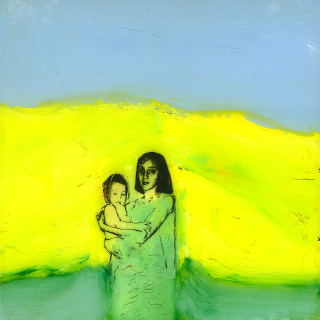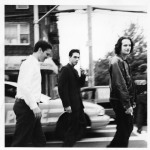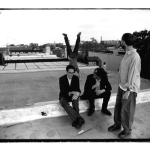Clem Snide: You Were A Diamond LP (HHBTM Records)
Release date: November 18, 2016Download zip file:
Bio: excerpt from interview conducted a few years back w/HHBTM founder & CEO Mike Turner for article about the label called HHBTM Records: 10 Years Of Angst & Regret.
Q: So given that you were already hanging out in Athens a lot, In the Aeroplane Over the Sea must have been a big deal for you when it came out.
A: Not really. At the time, I was just completely obsessed with this record by Clem Snide called You Were a Diamond that to me just did everything Neutral Milk did, but did it so much better. More heartfelt, more raw. In fact I actually kind of slammed the Neutral Milk record in my zine because there seemed to be all this hype behind it while this other record that I loved so much was just getting brushed aside. But of course I kept hearing Aeroplane everywhere I went and eventually yeah it clicked with me and I realized it was brilliant and everything people say it is. So yeah, I guess I felt a little embarrassed about that.
Q: Embarrassed because you’d said Clem Snide’s record was better?
A: No. I’ve never been embarrassed about that. That record’s amazing. It still kills me that nobody seems to know about it.
Some records you put out because you like them, some records because you love them, and some records you put out because it’s an obsession and you want the whole world to hear this thing that has so much to offer.
You Were A Diamond is a record that is both haunting and haunted (that cello, the way it mimics the scraping of fragmented skull against fragmented brain). Like paintings done on glass instead of canvas, fragile and yet somehow more luminous. Clem Snide’s music is impossible to reduce to a literal description—can’t call it alt-country when there’s a cello, call it lo-fi even though you’re able to hear every note, call it folk, even though there is a predominent electric guitar. All of this adds up to the most unlikely of sonics. Call it Clem Snide.
Or maybe call it the missing link between John Cale and Hank Williams.
Even the band name, Clem Snide, sounds like a demented Flannery O’Connor character, But it’s actually from a William Burroughs novel. Urban Gothic?
And then there’s the songs. ‘Better’ is a song of staggering empathy. The way Eef Barzelay urges his (friend? love? self?) to take off their sweater because it’s warm outside, but—and this is the difference between lyrics & singing—the way he strings out ‘waarrrrm outsIIIDE’ is one of the most beautiful things I’ve ever heard. And then there’s ‘Nick Drake Mixtape,’ and oh my god ‘Your Night To Shine’ with its lines about mustard gas and blood in the lungs. How have these songs not appeared in every film? Every poignant moment portrayed on TV? How can something this powerful—this warmly bleak, this achingly human—be so overlooked?
You Were A Diamond didn’t go completely unheard at the time (even Pitchfork eventually called it ‘a beautiful and gently melancholy album that crawls under your skin’), but it doesn’t get talked about now. Which makes sense, in a way.
The world still isn’t ready for Clem Snide because the world remains as broken, unjust and fucked-up as it’s been since the day Clem Snide was born. And we’re all still too afraid of what might happen if even for an instant we stopped smiling in public, and so we spin on ever-faster in this neverending carnival ride of desperate apocalyptic joy. But if we would just be real for a second about the anxiety & pain of being alive, then Clem Snide would be indispensable even though in a sense they already are.
A bit of Early history from Dan Efram (Tractor Beam Records)
I met the band Clem Snide in Boston circa 1991. Their brash style at the time represented more prog/art rock than alt-country. After moving to NYC, I heard from Eef a few times and received their latest cassette which included solo demos of many of the songs that would end up on Diamond. And, after leaving a record label job at Zero Hour Records where I helped bring in a bunch of challenging music including many that no one has ever heard of and some that a few may have (i.e. Varnaline (Anders Parker), Space Needle, Dirt Merchants, Grover, Stephanie Sayers, The Black Watch, others…), I decided that Clem Snide was my next project.
Besides signing on to manage them, I helped to fund “Diamond” with producer Adam Lasus. This album was a labor of love. Its vibe, created at Lasus’ Fireproof Recording in barren, isolated Red Hook, Brooklyn circa 1997/8 was terrible to get to, but once there it was isolated enough to give the band time and space to make this masterpiece of an album. One that launched my label and their career.
Shortly thereafter, the band was signed to Sire Records by none other than Seymour Stein on the strength of what the band, Lasus and Marty Brumbach (whom helped produce and mix a number of the tracks) recorded was a pretty big high for me as well. Though in the end this deal nearly ruined the band, having Seymour Stein woo us by singing old country and western songs to us - unaccompanied in his office - felt like a pretty big deal at the time.
Q: So given that you were already hanging out in Athens a lot, In the Aeroplane Over the Sea must have been a big deal for you when it came out.
A: Not really. At the time, I was just completely obsessed with this record by Clem Snide called You Were a Diamond that to me just did everything Neutral Milk did, but did it so much better. More heartfelt, more raw. In fact I actually kind of slammed the Neutral Milk record in my zine because there seemed to be all this hype behind it while this other record that I loved so much was just getting brushed aside. But of course I kept hearing Aeroplane everywhere I went and eventually yeah it clicked with me and I realized it was brilliant and everything people say it is. So yeah, I guess I felt a little embarrassed about that.
Q: Embarrassed because you’d said Clem Snide’s record was better?
A: No. I’ve never been embarrassed about that. That record’s amazing. It still kills me that nobody seems to know about it.
Some records you put out because you like them, some records because you love them, and some records you put out because it’s an obsession and you want the whole world to hear this thing that has so much to offer.
You Were A Diamond is a record that is both haunting and haunted (that cello, the way it mimics the scraping of fragmented skull against fragmented brain). Like paintings done on glass instead of canvas, fragile and yet somehow more luminous. Clem Snide’s music is impossible to reduce to a literal description—can’t call it alt-country when there’s a cello, call it lo-fi even though you’re able to hear every note, call it folk, even though there is a predominent electric guitar. All of this adds up to the most unlikely of sonics. Call it Clem Snide.
Or maybe call it the missing link between John Cale and Hank Williams.
Even the band name, Clem Snide, sounds like a demented Flannery O’Connor character, But it’s actually from a William Burroughs novel. Urban Gothic?
And then there’s the songs. ‘Better’ is a song of staggering empathy. The way Eef Barzelay urges his (friend? love? self?) to take off their sweater because it’s warm outside, but—and this is the difference between lyrics & singing—the way he strings out ‘waarrrrm outsIIIDE’ is one of the most beautiful things I’ve ever heard. And then there’s ‘Nick Drake Mixtape,’ and oh my god ‘Your Night To Shine’ with its lines about mustard gas and blood in the lungs. How have these songs not appeared in every film? Every poignant moment portrayed on TV? How can something this powerful—this warmly bleak, this achingly human—be so overlooked?
You Were A Diamond didn’t go completely unheard at the time (even Pitchfork eventually called it ‘a beautiful and gently melancholy album that crawls under your skin’), but it doesn’t get talked about now. Which makes sense, in a way.
The world still isn’t ready for Clem Snide because the world remains as broken, unjust and fucked-up as it’s been since the day Clem Snide was born. And we’re all still too afraid of what might happen if even for an instant we stopped smiling in public, and so we spin on ever-faster in this neverending carnival ride of desperate apocalyptic joy. But if we would just be real for a second about the anxiety & pain of being alive, then Clem Snide would be indispensable even though in a sense they already are.
A bit of Early history from Dan Efram (Tractor Beam Records)
I met the band Clem Snide in Boston circa 1991. Their brash style at the time represented more prog/art rock than alt-country. After moving to NYC, I heard from Eef a few times and received their latest cassette which included solo demos of many of the songs that would end up on Diamond. And, after leaving a record label job at Zero Hour Records where I helped bring in a bunch of challenging music including many that no one has ever heard of and some that a few may have (i.e. Varnaline (Anders Parker), Space Needle, Dirt Merchants, Grover, Stephanie Sayers, The Black Watch, others…), I decided that Clem Snide was my next project.
Besides signing on to manage them, I helped to fund “Diamond” with producer Adam Lasus. This album was a labor of love. Its vibe, created at Lasus’ Fireproof Recording in barren, isolated Red Hook, Brooklyn circa 1997/8 was terrible to get to, but once there it was isolated enough to give the band time and space to make this masterpiece of an album. One that launched my label and their career.
Shortly thereafter, the band was signed to Sire Records by none other than Seymour Stein on the strength of what the band, Lasus and Marty Brumbach (whom helped produce and mix a number of the tracks) recorded was a pretty big high for me as well. Though in the end this deal nearly ruined the band, having Seymour Stein woo us by singing old country and western songs to us - unaccompanied in his office - felt like a pretty big deal at the time.



